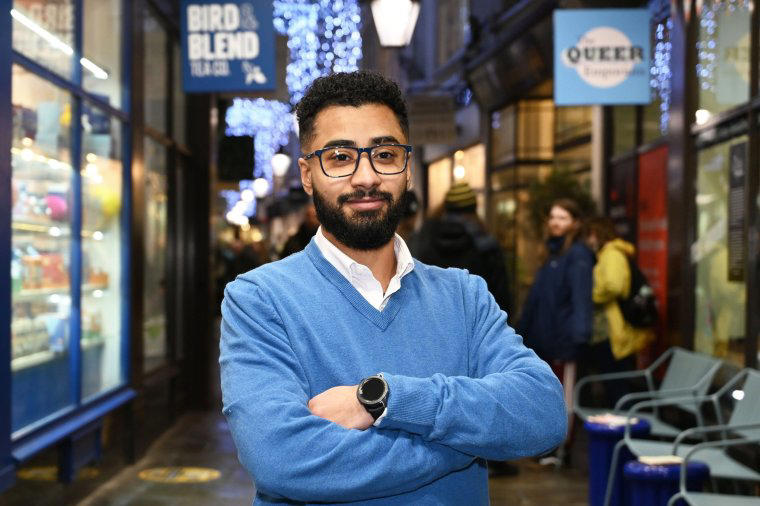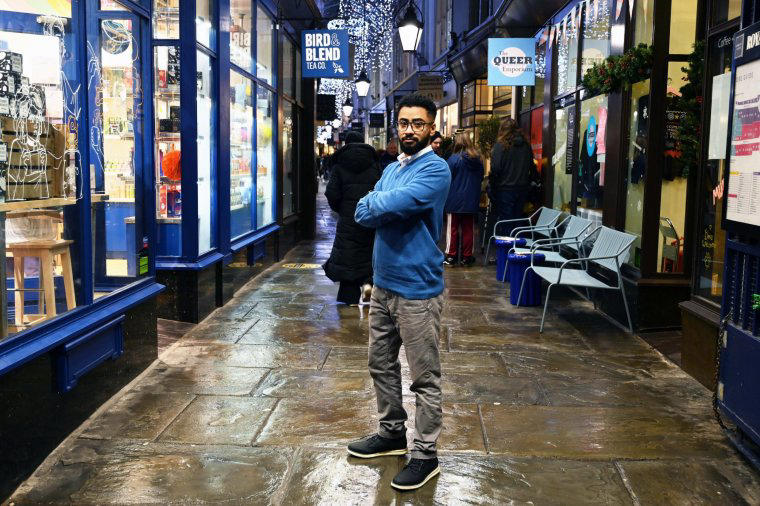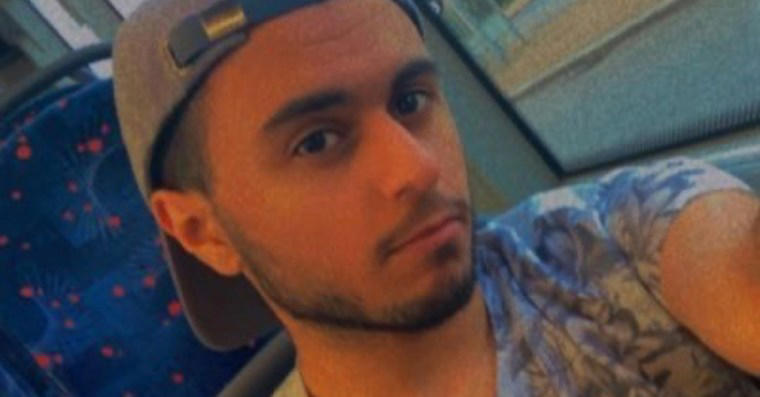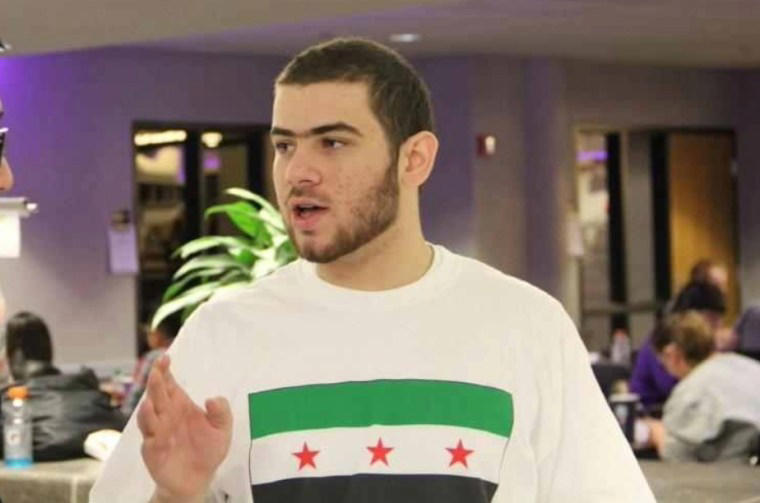‘I was going to lose my life’: LGBTQ Saudis reveal the truth about the regime
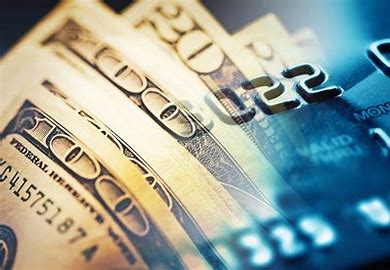










‘I was going to lose my life’: LGBTQ Saudis reveal the truth about the regime
“Your name is on the system. You’re going to be arrested soon.” These were the words that changed Alvin’s life. He knew what they meant: he would be captured, imprisoned, and possibly executed. He was 19 at the time. “I was going to lose my life,” he says now.
This is the reality for LGBTQ people in Saudi Arabia under sharia law – a death sentence, a prison sentence, or a life of secrecy and terror. But the details of how the regime hunts down this community can now be revealed: the secret network of officials and religious police who spy on them, the cyber surveillance through government apps and dating apps, the third-party agents who lure them back from abroad, and the doctors who collaborate with the authorities.
Danger often arises too from within their own communities – pressured into marriage, placed in institutions to make them conform, or hospitalised with vomit-inducing medication to “cure” them. Their lives under constant threat. Those lucky enough to escape to Britain can sometimes then face sexual harassment in asylum centres.
Alvin’s crime was being transgender. To stay alive would mean having to give all his savings to a government official in the hope that his file in Saudia Arabia would be wiped. To cope psychologically would mean having to become the man he knew himself to be in a country where trans people are prosecuted under the same laws against crossdressing and homosexuality used against gay people.
It would mean secretly injecting himself with black market testosterone, concealing the changes to his face, voice, and body under a niqab, leaving his family without a word, and risking his life in one final attempt to flee the country.
He had one shot.
Alvin’s testimony forms one of the first public accounts of an openly trans Saudi man – and one of three LGBTQ Saudis speaking out to i. Together, they offer an extraordinary insight into a community so hidden and threatened as to exist almost entirely underground.
This is not what the Saudi government wishes to convey to the West. As the only country left bidding for the 2034 World Cup, the regime is embarking on a mass public relations campaign to encourage investment and tourism. After buying up Newcastle United in 2021 and this year effectively taking over professional golf in a $1bn deal with the PGA, a different story is now being told about the Kingdom.
Saudi sports minister Prince Abdulaziz bin Turki al-Faisal told the BBC last week that those who accuse the country of sportswashing – using sport to distract from wrongdoing – are “very shallow” and often “haven’t been to Saudi”. A CNN headline in May this year read, “Saudi says it welcomes LGBTQ visitors”. In fact, what the Saudi Tourism Authority said about LGBTQ tourists was: “Everyone is welcome” and “visitors are not asked to disclose such personal details”.
Saudi nationals and residents, meanwhile, are being investigated. Those who even hint at their LGBTQ identity publicly can expect a brutal reception. Tala Safwan, an Egyptian social media influencer (with five million followers on TikTok) living in Riyadh, was arrested last year after posting a video deemed to have lesbian undertones.
Suhail Al-Jameel was imprisoned and reportedly lashed 800 times after posting a picture of himself in small, leopard-print shorts on social media. Released last year, and now aged 27, his whereabouts are currently unknown, with some who spoke to i fearing he has been recaptured, or worse. And Eden Knight, a 23-year-old trans woman studying in the US, killed herself in March after American fixers were reportedly hired to encourage her to de-transition and return her to her family, according to an investigation by Vice.
Yet high-profile Westerners who accept Saudi money insist their presence will help. When Jordan Henderson, the England midfielder, joined the Saudi football club Al-Ettifaq in a £700,000-a-week deal this summer, he said: “We can all … criticise different cultures and different countries from afar. But then nothing’s going to happen. Nothing’s going to change.” He added that having someone in Saudi Arabia with his pro-LGBTQ views “is only a positive thing” and likened it to having the World Cup in Qatar which “shined a light on certain issues … and changed some rules and regulations”.
But the notion that footballers or a World Cup can advance progress in this absolute monarchy is, according to those who spoke with i, naïve at best. “Scandalous,” was how one gay Saudi put it. “Whitewashing,” said another. First, they said, the whole truth needs to emerge.
Alvin is 28 now. We talk over several hours from his flat in Cardiff, where he is forging a new life as a refugee. He sports a beard, glasses, and a black Adidas top – a world away from the abayas and niqabs of the first two decades of his life. When the dark ironies of his story surface they bring half-smiles; almost a grimace. When the hardest memories intrude, he inhales on rollups.
“From a really young age I knew,” says Alvin. He couldn’t understand why his genitals didn’t match the boy he knew himself to be. He wore boys’ clothes and spent all his time with boys. For him, this was natural – he was one of them. It was strange and confusing for his Shia Muslim family, living in Qatif in the Eastern Province. Aged nine, they clamped down.
“I was forced to go to a religious centre by my family because they thought they could change my behaviour as a little boy and switch it to a little girl. I spent most of my childhood life stuck in this centre,” he says. It was for girls only. “I heard this cousin who owned the centre tell my family, ‘She pretends to be a boy and this centre is going to help her.’”
He refused to go at first, then ran away, only to be picked up off the street and brought back. Along with Islamic studies, it was “to learn how to be very feminine. They tried to control my identity”. He was made to wear an abaya.
At secondary school, the chasm between his external and internal self began to rupture. “When I got my period, I became anxious, depressed, spent nights and nights crying because I thought that would never happen to me.” His brothers were enlisted to ensure he conformed; to cover his face, wear a bra and women’s underwear, and to abandon the boxer shorts he had always worn.
During adolescence he became aware that he was attracted to girls. The belief held by some in the West that people in the Middle East transition to avoid homophobia is a mistake, he says, because it’s harder to transition than to be a lesbian in Saudi Arabia. Gender identity is also distinct from sexual orientation, he explains, which for him developed “from a very young age”, before his sexuality emerged.
At 17 in 2012, Alvin was pressured into marrying a man, in an arrangement with another family. His husband would complain about Alvin. “He said, ‘I feel like I’m with another guy not a woman.’ He tried to have sexual relations with me. I told him no.” On one occasion, Alvin thought he would vomit.
The marriage collapsed after a few months. Alvin could no longer avoid the reality facing him. In 2014, aged 19, he realised he needed help. Saudi Arabia blocks online content relating to LGBTQ issues, so with no information (not even knowing that being transgender is an imprisonable offence) he sought out a doctor at a clinic a 50-minute drive from his hometown. He was unaware how dangerous this decision would be.
“The doctor pretended that he was going to help me, to start my transition,” he says. Alvin was delighted initially, before realising there was a catch. The doctor wanted Alvin to encourage other trans people to seek his help. The motivation seemed suspicious, that this could be a ruse to obtain names that the doctor could report to the authorities.
Alvin returned for what would become his final appointment.
“I went to the clinic and the religious police were there,” he says. Several officers from the Commission for the Promotion of Virtue and the Prevention of Vice – the morality police known as mutaween – were waiting for him. “They punish people, they jail people.” Their powers have since been curtailed, but in 2014, they patrolled public spaces carrying sticks.
“I was really scared,” says Alvin. “They asked me lots of questions, ‘Where are you from?’, ‘You told the doctor you feel like a man?’” Terrified, Alvin thought quickly, and told them he no longer had those thoughts, that he wasn’t feeling well, and ran out.
By the time Alvin arrived home, he had multiple calls on his phone. He blocked each number but knew it was pointless because they had his birth name – an uncommon one – and phone number, easily enough to discover his home address.
Aware of how the Saudi regime operates, Alvin feared it was only a matter of time before they apprehended him. By now at university and working part time, he remembered that one of his colleagues had links within a family close to the Saudi royal family.
“Immediately I called her and said, ‘Please contact anyone you know in the government and [ask them to] search for my name to see if they’re going to arrest me.’” His colleague knew someone high up in the security services. She called Alvin back at midnight and told him there was a file on him and he was about to be arrested. “If this happens, I’ll lose my life,” he told her, “Please tell him I will give him whatever money he wants.”
A couple of hours later, she rang back and informed Alvin the official wanted 25,000 SAR (about £5,000) to close his file. Alvin’s entire savings amounted to a little less, so they agreed a deal. He would hand over every penny he had in exchange for the file being destroyed.
They met at a location far from Alvin’s home. The official handed over the document. There were four charges, which he later emails over in translation: “1. Resembling the opposite gender and sexual deviation. 2. Violation of public decency and openly committing sin. 3. Inciting public opinion on Twitter [now X], which is a cybercrime. 4. Questioning the integrity of a doctor accredited by the ministry of health.”
“I started crying a lot,” he says. Any one of those charges would be enough to face years in jail or worse. The official destroyed the file in front of him, but this was no guarantee. Alvin’s Twitter account was anonymous, so he believed the security services would have already engaged in cyber surveillance of him. The words of Alvin’s colleague continued to ring in his mind: “You have to be careful in the future.”
He knew what he had to do.
It would take four years to escape the country, during which the challenge was to stay sane, stay alive, and if possible, begin to transition so that by the time he fled he had at least begun the process. Through a friend in Bahrain, he contacted a doctor in the UK for advice about hormone treatment, but the only way to buy testosterone in Saudi Arabia was on the black market from bodybuilders. “I bought a lot,” he says, and began injecting himself.
This presented a problem: how to disguise his increasing facial hair and deepening voice caused by the hormone injections. He started wearing a niqab to cover his face in public. He secretly shaved his face every day to keep the stubble at bay. But this caused acne, so he asked his mother if he could have wax treatments on his face, knowing that waxing often caused spots on women’s faces, so even his pimples could be explained. When his family began noticing his voice was lowering in pitch, he said he was tired or had a cold – and because this happened incrementally over many months, they never noticed a sudden, dramatic change.
As his appearance began to change, he would at times drive to another town, remove his abaya and niqab, and wander around presenting as a boy. “It felt euphoric,” he says – like oxygen. “It was a huge moment.”
In 2018, Saudi Arabia had changed the laws allowing women to obtain a passport without their male guardian’s permission, so as Alvin was still legally female, he applied for one unaware that his father - his guardian – would be informed about it by text. His father started asking him every day if he’d received the passport, demanding he hand it over. Alvin stalled him, telling him it hadn’t arrived, while applying for a visa to leave the country.
As soon as the visa was approved, “I rented a flat for two days, kept my clothes there with my passport, I wanted to make sure everything was in a safe place because I was suspicious that someone would report me. I didn’t sleep for three days, I couldn’t eat.”
Only two friends knew what Alvin was about to do. He resigned from his job, booked an Uber to take him across the border to Bahrain from where he would board a flight to London. He went home to his family, told his mother he needed to go to the pharmacy, and never returned.
As the car crossed the border into Bahrain, “I was very nervous,” he says, “I kept silent all the way.” He wore his abaya but removed his headscarf and applied make-up to cover his stubble. “But I felt, ‘finally I’ll be rid of this city, this society’, because all my life I’d been dreaming of this moment, of escaping – and here we go.”
Safely in Bahrain, Alvin boarded the plane in his abaya, and was sat next to a man who soon fell asleep. When he awoke, Alvin was dressed as a man. That first hour of the flight was the last time he had to conceal who he was.
He composed a text message to his father, telling him he was trans and had left the country. On touch down, he sent the text, turned his phone off, and applied for asylum at Heathrow. Alvin was taken to an asylum centre in London before being transferred to Cardiff.
In January 2020, Alvin was walking down his road when his solicitor rang to tell him his asylum claim, granting him refugee status, had been accepted. “I started celebrating in the street,” he says. “I felt that my new life was starting. It was a great moment.”
Most of his family has not accepted him, says Alvin, and he rarely contacts them. “I think that’s better for all of us – to protect them from the government and to protect myself emotionally.”
The following year, Alvin shared a photograph on X of his chest following surgery. “It went viral in Saudi, it has over 1 million impressions,” he says, because “famous people [Saudis] were bullying me”. But there were supportive messages too. A teacher from his school messaged him anonymously saying she told a colleague at the time that she thought he was a little boy. If he had been a trans woman, however, the reception would have been worse, he says, due to pervasive patriarchal attitudes.
Alvin scoffs at the idea that giving Saudi Arabia the 2034 World Cup might change anything. “Of course not,” he says. “Like what happened in Qatar. In Gulf countries, they welcome white people who are queer but for the citizens it’s never the case.” The Saudi authorities “hide the truth,” he says, concealing their oppression of LGBTQ Saudis, “and whitewash”.
Organisations supporting people like Alvin are dealing with increasing numbers of similar cases. “We have helped 39 people from Saudi Arabi this year alone,” Leila Zadeh, the CEO of Rainbow Migration, a UK charity helping LGBTQ people fleeing persecution, tells i. “That number has gone up. We’re seeing more people approach us from Saudi and they’re now among the highest nationality among our service users.”
When they arrive in the UK to claim asylum, they may not be safe, however.
“One of the big issues is the abuse and harassment that’s happening in [asylum] accommodation,” says Zadeh. “They’re being put into hotels. And currently, the Government is forcing people to share rooms in these hotels.” The consequences can be devastating.
Reports have previously emerged in the US about sexual violence against LGBTQ people in immigration centres. But now in Britain, “We have seen people who’ve been subjected to horrific sexual harassment in these hotels, including people from Saudi Arabia, and the Government is refusing to include LGBTQI+ people in a policy that says these people are at risk of harm and shouldn’t be forced to share rooms”, she says.
Rather than any preventative measures being implemented, “what happens in practice is they have to be harmed first and only then will the Home Office move them somewhere more appropriate.”
A Home Office spokesperson said: “We take the welfare and safety of those in our care incredibly seriously and any allegations of abuse are investigated thoroughly and escalated appropriately.”
It isn’t only sexual harassment. Often cramped in with other asylum seekers, some of whom express prejudices, “LGBTQI+ people can be exposed to an environment that is very similar from that which they’ve fled. So they can be subjected to homophobic, biphobic and transphobic abuse”.
This is taking place while also making their asylum claims. But proving your case can be harder if the persecution you suffer comes not from police but from your family, says Zadeh. In a case Rainbow Migration supported, a nonbinary asylum seeker was “trying to explain their gender identity to their family when one of the members of their family tried to stab them”.
In an asylum hotel in England, Shibl al-Shibl, 22, is talking quickly, aware how fortunate he is: his asylum claim has just been accepted. “I am happy but not surprised. They [the British government] know how dangerous and awful Saudi Arabia is for gay people.”
His manner is matter-of-fact but energetic. He looks young – boyish – but his story reveals not only the depth of what faces gay people in Saudi Arabia but the heights they must scale to stay alive.
While there are some who manage to socialise in private with other gay people, or secretly meet through dating apps – particularly in major cities such as Riyadh – LGBTQ Saudis say this relies partly on wealth and status. If caught, being rich can help protect you to an extent but a person’s family’s attitudes can dictate their safety.
Shibl was raised in Jeddah in western Saudi Arabia, in what he describes as a standard conservative family. “But average in Saudi Arabia means not only rejecting gay people but insulting and harming them,” he says.
At 13 he realised he was different from the other boys when a fellow pupil showed him pornography on his phone. “I was focusing on the man,” he says. “Step-by-step I knew.” He thought at first it would pass, but when it didn’t, “I felt ashamed and hated myself. It affected me severely”. Fellow pupils at school would hurl homophobic slurs at him.
In late 2021, aged 20 and now at university, Shibl realised he could no longer ignore who he was, nor its implications. He already had a taste of how perilous it is to rebel.
“I left Islam in 2017, so my life was hard because I had to pretend – pretend to pray and fast.” Apostasy is a crime punishable by death in Saudi Arabia. Sometimes he would be caught eating in the afternoon during Ramadan. “My family threatened me,” he says. And as a young gay man he faced several layers of danger if discovered.
“I would be treated as a mentally ill person. Conversion therapy is happening in Saudi hospitals. My father told me gay people should be cured and homosexuality is a sickness. And in Saudi Arabia they think their sons and daughters are your personal property, so you have the right to do anything to make him a better person.”
Being pressured into marriage would be the next layer, but “if someone even doubted my sexuality, my future would be dark. I would be abused verbally and physically. If I had told my family I was gay, I wouldn’t be here in front of you.”
It isn’t only the police or one’s family that poses a threat. “The danger is coming from the Saudi people. At university one of my colleagues said not only that if he met a gay person he would beat them but that ‘I should beat him’. The most horrible thing is when you hear people insulting gay people you can’t say a single word. If I stayed in Saudi Arabia I thought I would die a hypocrite.”
He knew he had to escape. But the decision was almost unbearable.
“I had to leave everything behind to be truly who I am,” he says. “I had to leave my homeland, my family, my friends, my colleagues, my university. It was very tough. I was crying for several days.”
The day before he fled, Shibl was beset by internal conflict. “Happy, because I won’t be forced to pretend that I’m straight anymore, but I looked at my family, and at my mother and knew this was the last time I would see her. I spent the night crying in my bed.” A stark truth collided with this, however: “this is the same family that would kill me or torture me if I told them about my reality”.
To escape, he had to request his passport from his father, pretending he was going on a trip to Dubai with friends. He applied for a visa to Britain and took a plane to London. It was October 2022.
In the air, Shibl saw his country from a great height, and confronted its impact on him. “I hate Saudi Arabia,” he says. “I have no loyalties – why would I be loyal to a country that wants to imprison me or kill me?” He had never been to Britain before.
At Heathrow, he applied for asylum and came out to his family on WhatsApp. His sister blocked him a few days later. Then his mother blocked him. Shibl messaged his father to ask if he had told them to block him. “He said it was not my business.”
The reason members of his family ended their relationship with him reveals more about Saudi Arabia than their personal feelings, he believes. Before they blocked him, Shibl came out on X, formerly Twitter, using his full name, including his tribe name. His post received 300,000 impressions. “This brings huge shame to my tribe,” he says.
Shibl said he received hundreds of abusive messages, including one threatening to slash his throat.
The first few months in Britain were hard, as he absorbed the rejection from his family, but the relief now is obvious. “I feel free,” he says. “I have my dignity and I have a future.” But he knows how different it could have been if he’d been a gay woman. “For lesbians the situation is hard, because it’s uncommon for Saudi families to give passports to their daughters.”
Given its human rights record, Shibl is astonished Saudi Arabia will host the 2034 World Cup. “It’s pretty scandalous,” he says, adding that changes are likely to be temporary and apply only to visitors. Any real progress will take many more years.
“Because in the end,” he says, “Western countries are benefiting from Saudi Arabia, they are taking oil from them. America has big military bases in Saudi Arabia so they want to ignore all of these things. Western countries don’t care about human rights [in Saudi Arabia]. If Fifa cared about human rights they wouldn’t have given the World Cup to Qatar.”
Thousands of miles away in Kansas City, Minnesota, Wajeeh Lion – a human rights activist and one of the first openly gay Saudis – is even more enraged about Saudi public relations wins.
What are the chances that a football tournament will unleash a new era of human rights in this Gulf state? “None,” Wajeeh replies in his living room. “It’s just an excuse to exploit the financial benefits of a country like Saudi Arabia hosting a World Cup.”
For nations like Qatar and Saudi Arabia who have to invest billions to host such an event, the motivation isn’t profit, he says. “They’re not looking for financial return; they’re looking to clean their bloody image. If you think you’re going to gift a country a World Cup in return for human rights that haven’t been put in place in a constitution, then you’re lying to yourself.”
“It’s crazy,” says Wajeeh. “Saudi whitewashing is finally paying off. Their efforts to enhance their image on the world’s stage and their willingness to go to the farthest extent to fix that image is not going to stop. But in the meantime, we’re paying the price – the Saudi taxpayer who doesn’t have any representation, who doesn’t have any human rights, is the one paying the price.”
Wajeeh’s fury becomes increasingly understandable as his story unfolds.
He was raised by a strict conservative family in Jeddah and then Riyadh until the age of 12. By then he knew he was attracted to other boys. “I grew up listening to my parents talk about how we deserve to be tortured and killed and thrown in prison,” he says. “My father was responsible for sending me to religious camps, where I was getting sexually assaulted and beaten and harassed.”
A Saudi friend of his was subjected to conversion therapy, in which a psychiatrist from a local hospital came to the family home and made him simultaneously masturbate to gay pornography while taking a pill that induced vomiting. “His idea was that I would come to relate same-sex attraction with vomit,” Wajeeh’s friend later told The Athletic. Other reports from Saudis include similar treatments within hospitals, de-transition practices, and sheikhs being brought to the house to drive the “demon” out of LBGTQ people.
For Wajeeh, however, leaving Saudi Arabia for the US with his family didn’t mean escaping its tentacles. In 2016, then a 23-year-old student, his mother found his messages to other men on Facebook. After being confronted angrily by his parents, Wajeeh came out publicly and started receiving death threats. Fearing for his safety and with help from his university, he fled to a safe house.
“Someone that claimed to be from the Saudi embassy called me right before I went to the safe house,” he says. Their message was clear: “Return or we’ll execute you.” He cannot be sure who this person was, however, or whether there is a credible threat against him.
But Wajeeh believes the Saudi regime – through a network of individuals and organisations in the US – continues to pose a risk to his safety. “A member of the Saudi cultural attaché confirmed that they are keeping eyes on me and following where I go,” he says. He fears that he will be kidnapped or otherwise returned to Saudi Arabia, as Eden Knight, the young trans woman was.
Earlier this year, he says, a US non-profit organisation approached Wajeeh purporting to be interested in helping him become a delegate to the UN regarding LGBTQ issues in Saudi Arabia. A representative of the organisation asked him to attend a meeting at the Saudi embassy with the Saudi ambassador. Wajeeh was immediately alarmed.
It was the Saudi consulate in Istanbul where in 2018 the journalist and Saudi dissident, Jamal Khashoggi, was lured and killed. The UN said it “constituted an extrajudicial killing for which the state of the Kingdom of Saudi Arabia is responsible”.
“It’s scary,” says Wajeeh, “the extent that they’re willing to go – that they’re starting to hire American fixers.” The use of third-party agents became particularly apparent in widespread reporting regarding Eden Knight.
But a few months before Khashoggi’s murder, his wife’s phone had been hacked using the Pegasus spyware. And it’s the use of cyber surveillance against LGBTQ Saudis that particularly concerns Wajeeh now.
“Saudi Arabia is becoming more of an electronic police state. Everyone has to have specific apps, governmental apps, that has access to their personal information,” he says. One particular app was launched by the Saudi regime in 2017 on which “you can report people to the government, if you see something on social media” Its name is Kollona Amn which translates as, “We are all safe”.
This can dovetail with further surveillance activities by Saudi officials, says Wajeeh. “They use dating apps to hunt gay people. When they catch them they make them give up the personal information of other gay guys to hunt them down as well,” he claims.
But the pursuit of gay men takes other forms too. A gay migrant worker living in Riyadh told i what happens at a men’s massage parlour in the capital. If a customer doesn’t want to pay “they will make problems” and report them to police. Other times, Saudi officials use subterfuge and entrapment. They “act like customers” but when the transaction is made “they will announce they are police and raid all the people in the shop”.
Wajeeh continues to support fellow LGBTQ Saudis. But what has been the cumulative effect of everything on him psychologically?
“Let me show you,” he says. He tilts his laptop to his left, training the camera on the little table behind him. It’s full of bottles of pills. “This is my medicine,” he says. “A f**king pharmacy.” He no longer sleeps in the same bed as his husband, he says, because his trauma symptoms are too severe.
He kicks and punches in his sleep.
Story by Patrick Strudwick

